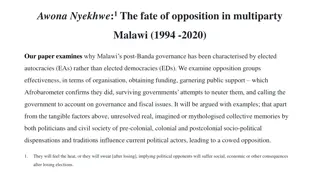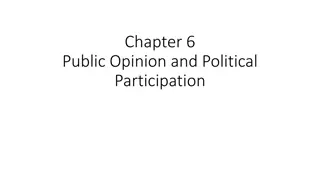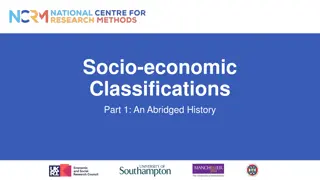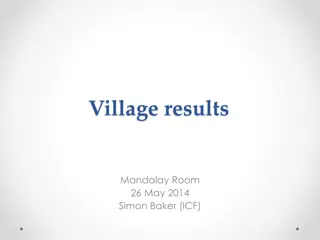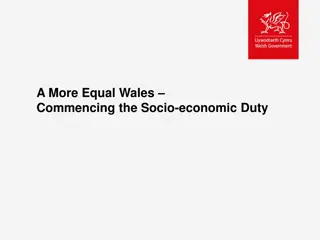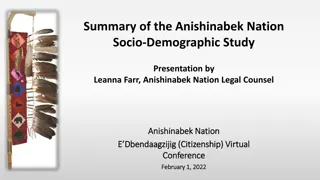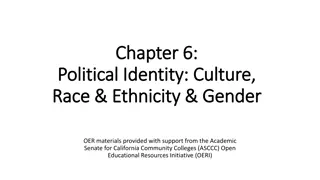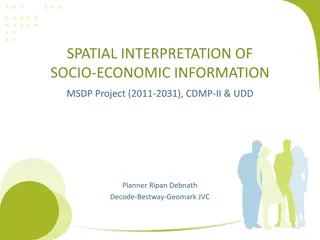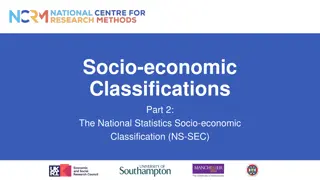Understanding Sustainable Business Models in the Context of Open Data and Socio-Economic Perspectives
Explore the intricate interplay between sustainable business models, open data practices, and socio-economic perspectives presented by Andrew Coote. Delve into the impacts, assessment methods, and the importance of data accessibility in decision-making. Gain insights into the FAIR principles and the
1 views • 16 slides
Understanding the Purpose and Origin of YESAA Legislation
YESAA, the Yukon Environmental and Socio-economic Assessment Act, was developed in collaboration with Yukon First Nations to ensure environmentally and socially responsible project assessments. The Act, passed in 2003, aims to protect environmental quality, heritage resources, and the well-being of
3 views • 19 slides
Types of Planning Surveys for Urban Development
Planning surveys play a crucial role in urban development by categorizing various types of surveys like Land Use, Housing, Socio-economic, and Transportation surveys. Each survey type serves a specific purpose, such as determining land allocation, studying housing conditions, assessing socio-economi
1 views • 17 slides
Interdisciplinary Approach in Political Science and Its Relation with History
The need for an interdisciplinary approach in political science emerged in the 20th century to study political issues from various social science perspectives. This approach emphasizes the interrelation between political science and other disciplines like history. History provides the foundation for
0 views • 23 slides
Institutionalism and Methodological Issues in Political Science
Institutionalism is a foundational concept in political science, emphasizing the study of governing institutions and their role in shaping political behavior. It explores inductive and deductive approaches to research, highlighting the significance of empirical evidence and theoretical assumptions.
0 views • 19 slides
Socio-technical Energy Transition Modelling: The TEMPEST Model
A simulation model, TEMPEST, incorporating societal and political factors, evaluates UK energy transition under three global SSPs. It analyzes the importance of political capital and societal preferences in adopting mitigation measures. The model's results are compared to the IMAGE model, suggesting
1 views • 5 slides
Understanding Gramsci's Political Theory and its Relevance Today
Gramsci's political theory, focusing on concepts such as hegemony, historical bloc, and the role of intellectuals, offers valuable insights into contemporary political challenges. Explored through the lenses of Prof. Ken Spours and Stuart Hall's analytical tradition, this analysis sheds light on Con
0 views • 13 slides
The Fate of Opposition in Multiparty Malawi: 1994-2020
This paper explores why Malawi's governance post-Banda has been dominated by elected autocracies rather than democracies. It delves into the effectiveness of opposition groups in terms of organization, funding, public support, and resilience against government attempts to suppress them. The influenc
0 views • 6 slides
Evolution of Citizenship in Liberal Democracy
Citizenship within liberal democracy entails equal rights, duties, liberties, and constraints for individuals within a political community. The entrenchment of civil and political rights has shaped the struggle for membership and participation in political communities. Civil rights, essential for in
1 views • 11 slides
Understanding Population Distribution in India
Population distribution in India is a complex phenomenon influenced by physical, socio-economic, and political factors. The distribution patterns vary across different regions, with factors such as relief, agriculture, educational systems, religion, and government policies playing significant roles.
0 views • 7 slides
Understanding Socio-Cultural Factors of Abnormal Behavior in Psychology
Exploring the impact of socio-cultural factors on abnormal behavior, this article delves into the influence of societal pressures, cultural norms, and economic status on mental health. The socio-cultural model emphasizes how societal criteria shape perceptions of abnormality, highlighting the role o
0 views • 7 slides
Understanding Political Theory through a Contextual Approach
Exploring G.H. Sabine's perspective on political theory through a contextual approach, emphasizing the importance of historical context and societal influences. Sabine argues that while political theory evolves with its contemporary politics, it should be analyzed within its specific time and social
0 views • 9 slides
Understanding Public Opinion and Political Participation
Public opinion and political participation are influenced by various factors such as financial interests, family, education, and party identification. Measuring public opinion accurately through scientific surveys is crucial in a democracy. Traditional participation methods like voting and civic vol
5 views • 7 slides
Evolution of Socio-Economic Classifications: A Historical Overview
Tracing the evolution of socio-economic classifications from Registrar General's Social Class in 1913 to National Statistics Socio-economic Classification in 2020, highlighting key changes and terminologies over the years.
0 views • 6 slides
Global Best Practices for Optimizing RE/EE Socio-Economic Impacts
The SE4JOBS Project aims to identify and analyze global best practices in optimizing socio-economic impacts through RE/EE deployment in developing and emerging countries. By examining key variables and causal relationships, the project seeks to inspire policy debates and decision-making processes to
0 views • 10 slides
Exploring Solidarity, Good Causes, and Socio-Spatial Identity
Delve into the concepts of solidarity, choosing a good cause for fundraising, and socio-spatial identity in a project setting. Discuss the proximity factor in determining solidarity, analyze decisions regarding sponsorships for projects focusing on women, children, health, or nutrition in varying ge
1 views • 24 slides
Understanding Political Beliefs and Behaviors: A Comprehensive Overview
Explore the formation, evolution, and transmission of political beliefs, as well as the impact of differing beliefs and behaviors on the political process. Delve into platform issues, political affiliations, and their influences to gain a deeper understanding of the political landscape.
1 views • 53 slides
Understanding Nationalism in Political Science
Nationalism, a complex concept, defines the nation as the fundamental unit of political rule. It encompasses a mix of objective and subjective factors, including cultural, ethnic, and political traits. The definition of a nation is subjective, based on how its members perceive themselves as a distin
0 views • 27 slides
Understanding Socio-Affective Development in Infants and Children
Socio-affective development focuses on how individuals interact with others and manage their emotions. It is influenced by factors such as personalities, morality, emotions, and spirituality. Attachment theory, proposed by John Bowlby, explains how infants form relationships with caregivers, startin
0 views • 16 slides
Understanding Political Science: A Comprehensive Overview
The study of political science delves into various aspects, from the pursuit of the good society to the exercise of power and the allocation of resources. It encompasses specialized fields such as American politics, international relations, comparative politics, public policy, and political philosop
0 views • 5 slides
Socio-economic Data Analysis of Selected Villages in Mandalay
This report presents detailed socio-economic data from selected villages in Mandalay, including information on ethnicity, religion, socio-economic background, availability of electricity, civil society groups and activities, source of credit, and water sources. The data provides insights into the de
0 views • 8 slides
Ecological Factors and Climatic Influences on Plant Life
Ecological factors play a crucial role in shaping the environment for organisms to thrive. This includes living (biotic) and non-living (abiotic) components like climatic factors, edaphic factors, topographic factors, and biotic factors. Climatic factors such as light, temperature, water, wind, and
0 views • 14 slides
Understanding Factors of Change in Business Environments
Factors of change in business environments encompass socio-cultural, economic, technological, political, and legal elements. These factors influence how businesses operate and make decisions in a dynamic world. The social environment, cultural environment, and economic environment play crucial roles
0 views • 8 slides
Political Development Theory and Practice: An Overview
Political development refers to the evolution of institutions forming the political power system of a society. Initially popular in the 60s-70s to describe political change, it later fell out of favor for being Euro-centric but has since regained significance. The concept encompasses aspects like po
0 views • 13 slides
Comprehensive Guide to Political, Socio-Economic, and Legal Thought Classes
This comprehensive guide covers topics for essays and presentations in Political, Socio-Economic, and Legal Thought classes. It includes deadlines, presentation subjects, essay requirements, and examples like Plato's ideologies on State, Economy, Law, Bio, Morality, and Society. Students must adhere
0 views • 11 slides
Political Party Funding Act 2018 Overview
The Political Party Funding Act of 2018 in South Africa aims to enhance multi-party democracy by regulating the funding and donations to political parties. It establishes the Multi-Party Democracy Fund funded by private sources, alongside the existing Represented Political Party Fund. The Act prohib
0 views • 17 slides
Understanding Political Party Funding Act of 2018
The Political Party Funding Act of 2018 regulates the funding of political parties in South Africa, ensuring equitable and proportional funding for parties participating in national and provincial legislatures. The Act defines various terms such as donations, foreign persons, and political parties,
0 views • 42 slides
Promoting Equality in Wales: Implementing the Socio-economic Duty
The Welsh Government is prioritizing equality and human rights, especially in the context of Brexit, by commencing the socio-economic duty outlined in the Wales Act 2017. This duty requires specified public bodies to consider how their decisions can reduce inequalities associated with socio-economic
0 views • 13 slides
Evolution of Political Ideas and Influences on American Founding
In the history of politics, major ideas like laws of nature, unalienable rights, divine right of kings, social contract theory, and rights of resistance have influenced the American founding. Various traditions such as Judeo-Christian, English common law, Enlightenment, and republicanism played a si
0 views • 68 slides
Insights from Anishinabek Nation Socio-Demographic Study Presentation
An overview of the Anishinabek Nation Socio-Demographic Study presented by Leanna Farr focused on various factors such as language usage, population trends, legislative impacts, and projections related to the Registered Indian population growth. The study highlights demographic shifts, language patt
0 views • 16 slides
Explore the Fascinating World of Political Science
The Department of Political Science offers a range of courses, delving into topics such as political theory, international relations, and governance. Understand the distinction between politicians and political scientists, and explore branches of political science like public administration and huma
0 views • 16 slides
Understanding Political Identity: Culture, Race & Gender in Society
Explore the intricate aspects of political identity, culture, race, ethnicity, and gender in society. Discover how individuals shape their identities and the impact of political mobilization on society. Uncover the significance of political socialization and the role of societal institutions in shap
0 views • 20 slides
Exploring Socio-Environmental Motifs and Multilayer Networks
The content delves into socio-environmental motifs, anti-motifs, and multi-plex networks in the context of national socio-environmental synthesis centers. It uncovers the least likely and common occurrences in random networks, as well as common subnetworks underrepresented in the model of inquiry. T
0 views • 7 slides
Spatial Interpretation of Socio-Economic Information in Urban Area
The project focuses on analyzing socio-economic data in Mymensingh Municipality from 2011 to 2031. It includes field verification findings, spatial interpretation results, maps/figures representing family and settlement types, and considerations for urban planning. The presentation outlines basic in
0 views • 35 slides
Evolution of Political Protests in Modern Russia: A Historical Overview
This article provides an in-depth analysis of the evolution of political protests in modern Russia from 1990 to present. It discusses the attitude of Russian journalists towards protests, basic concepts of political protest in modern political science, myths surrounding protests in Russia, and the f
0 views • 24 slides
Impact of Political Stability on Equity Trading Costs of Cross-Listed Firms
The research explores the relationship between political stability and equity trading costs of cross-listed firms, highlighting the impact of political institutions, liquidity, and investor protection. It delves into the importance of factors like quality of political institutions, transparency, and
0 views • 24 slides
Interdisciplinary Relationships in Political Science
Political science and history share a symbiotic relationship, with history providing the foundation for political analysis while political science influences historical events. The contribution of economics to political science is evident in how economic conditions shape political ideologies and pol
0 views • 12 slides
Understanding Political Theory: Definitions, Differences, and Significance
Political theory encompasses systematic explanations of political phenomena, distinct from political thought which involves ideas and opinions of philosophers. It constitutes both political science and philosophy, addressing both empirical and evaluative aspects. The significance lies in finding sol
0 views • 7 slides
Remedial Measures Implemented by Indian Political Party
Explore the impactful remedial measures taken by a prominent political party in India through a collage presentation. Delve into the functions of political parties, understanding partisanship, the necessity of political parties, and more. Gain insights into the significance and role of political par
0 views • 23 slides
Understanding National Statistics Socio-economic Classification (NS-SEC)
The National Statistics Socio-economic Classification (NS-SEC) classifies individuals based on their occupation and employment status, ranging from large employers to routine workers. This classification system provides insights into socio-economic trends and disparities in society.
0 views • 7 slides







